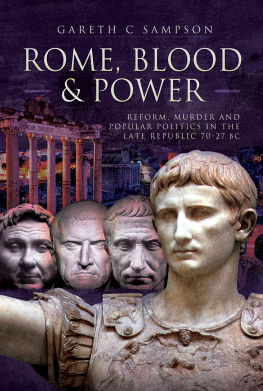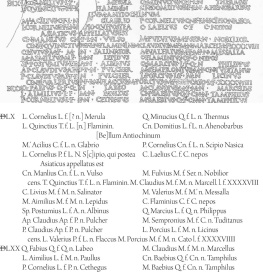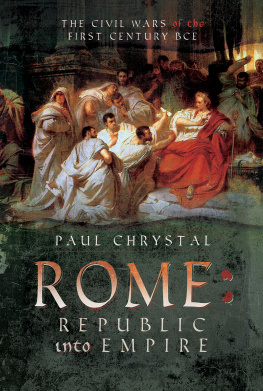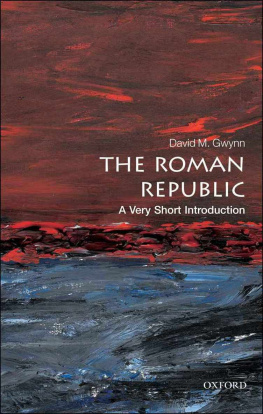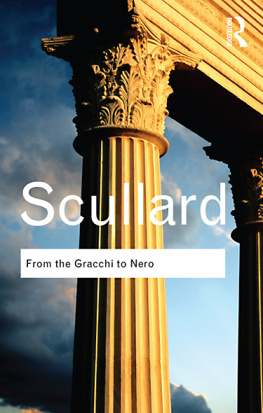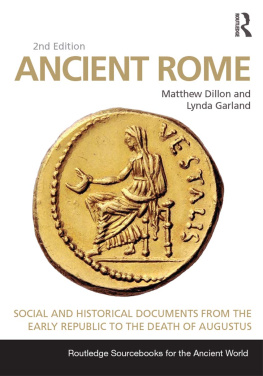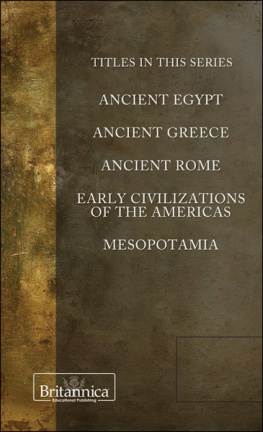VOLUME I
FROM THE TRIBUNATE OF TIBERIUS GRACCHUS TO THE SECOND CONSULSHIP OF MARIUS B.C. 133104
WITH TWO MAPS
TO
B. G.
AND
T. G.
PREFACE
Table of Contents
This work will be comprised in six volumes. According to the plan which I have provisionally laid down, the second volume will cover the period from 104 to 70 B.C., ending with the first consulship of Pompeius and Crassus; the third, the period from 70 to 44 B.C., closing with the death of Caesar; the fourth volume will probably be occupied by the Third Civil War and the rule of Augustus, while the fifth and sixth will cover the reigns of the Emperors to the accession of Vespasian.
The original sources, on which the greater part of the contents of the present volume is based, have been collected during the last few years by Miss Clay and myself, and have already been published in an abbreviated form. Some idea of the debt which I owe to modern authors may be gathered from the references in the footnotes. As I have often, for the sake of brevity, cited the works of these authors by shortened and incomplete titles, I have thought it advisable to add to the volume a list of the full titles of the works referred to. But the list makes no pretence to be a full bibliography of the period of history with which this volume deals. The map of the Wd Mellag and its surrounding territory, which I have inserted to illustrate the probable site of the battle of the Muthul, is taken from the map of the "Medjerda suprieure" which appears in M. Salomon Reinach's Atlas de la Province Romaine d'Afrique.
I am very much indebted to my friend and former pupil, Mr. E.J. Harding, of Hertford College, for the ungrudging labour which he has bestowed on the proofs of the whole of this volume. Many improvements in the form of the work are due to his perspicacity and judgment.
A problem which confronts an author who plunges into the midst of the history of a nation (however complete may be the unity of the period with which he deals) is that of the amount of introductory information which he feels bound to supply to his readers. In this case, I have felt neither obligation nor inclination to supply a sketch of the development of Rome or her constitution up to the period of the Gracchi. The amount of information on the general and political history of Rome which the average student must have acquired from any of the excellent text-books now in use, is quite sufficient to enable him to understand the technicalities of the politics of the period with which I deal; and I was very unwilling to burden the volume with a prcis of a subject which I had already treated in another work. On the other hand, it is not so easy to acquire information on the social and economic history of Rome, and consequently I have devoted the first hundred pages of this book to a detailed exposition of the conditions preceding and determining the great conflict of interests with which our story opens.
A. H. J. G.
OXFORD, August, 1904
CHAPTER I: Characteristics of the period. Recent changes in the conditions of Roman life. Close of the period of expansion by means of colonies or land assignments. Reasons for social discontent. The life of the wealthier classes. The expenses of political life. Attempts to check luxury. Motives for gain amongst the upper classes. Means of acquiring wealth open to members of the nobility; those open to members of the commercial class. The political influence of the Equites. The business life of Rome; finance and banking. Foreign trade. The condition of the small traders. Agriculture. Diminution in the numbers of peasant proprietors. The Latifundium and the new agricultural ideal. Growth of pasturage. Causes of the changes in the tenure of land. The system of possession. Future prospects of agriculture. Slave labour; dangers attending its employment; revolts of slaves in Italy. The servile war in Sicily (circa 140131 B.C.). The need for reform.
CHAPTER II: The sources from which reform might have come, too. Attitude of Scipio Aemilianus. Tiberius Gracchus; his youth and early career. The affair of the Numantine Treaty. Motives that urged Tiberius Gracchus to reform. His tribunate (B.C. 133). Terms of the agrarian measure which he introduced. Creation of a special agrarian commission. Opposition to the bill. Veto pronounced by Marcus Octavius. Tiberius Gracchus declares a Justitium. Fruitless reference to the senate. Deposition of Octavius. Passing of the agrarian law; appointment of the commissioners; judicial power given to the commissioners. Employment of the bequest of Attalus. Attacks on Tiberius Gracchus. His defence of the deposition of Octavius. New programme of Tiberius Gracchus; suggestion of measures dealing with the army, the law-courts and the Italians. Tiberius Gracchus's attempt at re-election to the tribunate. Riot at the election and death of Tiberius Gracchus, Consequences of his fall.
CHAPTER III: Attitude of the senate after the fall of Tiberius Gracchus. Special commission appointed for the trial of his adherents (B.C. 132). Fate of Scipio Nasica. Permanence of the land commission and thoroughness of its work. Difficulties connected with jurisdiction on disputed claims. The Italians appeal to Scipio Aemilianus. His intervention; judicial power taken from the commissioners (B.C. 129). Death of Scipio Aemilianus. Tribunate of Carbo (B.C. 131); ballot law and attempt to make the tribune immediately re-eligible. The Italian claims; negotiations for the extension of the franchise. Alien act of Pennus (B.C. 126). Proposal made by Flaccus to extend the franchise (B.C. 125). Revolt of Fregellae. Foundation of Fabrateria (B.C. 124). Foreign events during this period; the kingdom of Pergamon. Bequest of Attains the Third (B.C. 133). Revolt of Aristonicus (B.C. 132130). Organisation of the province of Asia (B.C. 129126). Sardinian War (B.C. 126125). Conquest and annexation of the Balearic Islands (B.C. 123132).
CHAPTER IV: The political situation at the time of the appearance of Caius Gracchus as a candidate for the tribunate (B.C. 124). Early career of Caius Gracchus. First tribunate of Caius Gracchus (B.C. 123). Laws passed or proposed during this tribunate; law protecting the Caput of a Roman citizen. Impeachment of Popillius. Law concerning magistrates who had been deposed by the people. Social reforms. Law providing for the cheapened sale of corn. Law mitigating the conditions of military service, 208. Agrarian law. Judiciary law. Law permitting a criminal prosecution for corrupt judgments. Law concerning the province of Asia. The new balance of power created by these laws in favour of the Equites. Law about the consular provinces. Colonial schemes of Caius Gracchus. The Rubrian law for the renewal of Carthage. Law for the making of roads. Election of Fannius to the consulship and of Caius Gracchus and Flaccus to the tribunate. Activity of Caius Gracchus during his second tribunate (B.C. 122). The franchise bill. Opposition to the bill. Exclusion of Italians from Rome; threat of the veto, and suspension of the measure. Proposal for a change in the order of voting in the Comitia Centuriata. New policy of the senate; counter-legislation of Drusus. Colonial proposals of Drusus. His measure for the protection of the Latins. The close of Caius Gracchus's second tribunate. His failure to be elected tribune for the third time. Proposal for the repeal of the Rubrian law. The meeting on the Capitol and its consequences (B.C. 121). Declaration of a state of siege. The seizure of the Aventine; defeat of the Gracchans; death of Caius Gracchus and Flaccus. Judicial prosecution of the adherents of Caius Gracchus. Future judgments on the Gracchi. The closing years of Cornelia. Estimate of the character and consequences of the Gracchan reforms.




